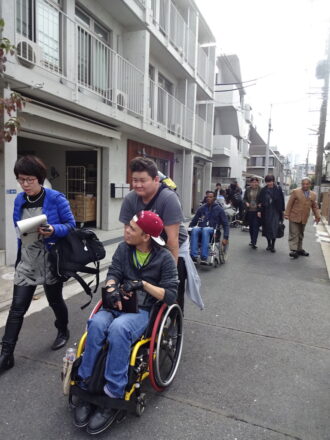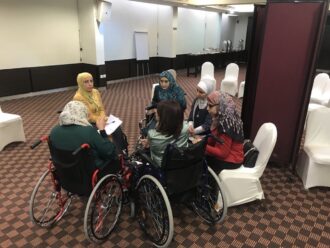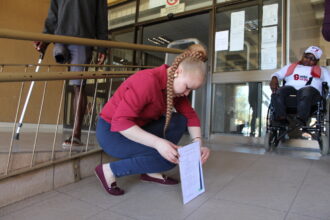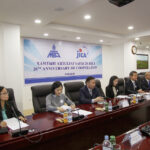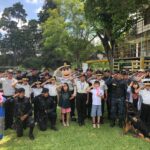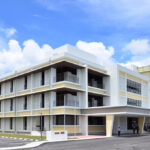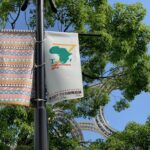The Japan International Cooperation Agency (JICA) has for many years contributed to projects around the world to protect the human rights and fundamental freedoms of persons with disabilities. We asked Professor Ishikawa Jun, a member of the UN Committee on the Rights of Persons with Disabilities, about their work.
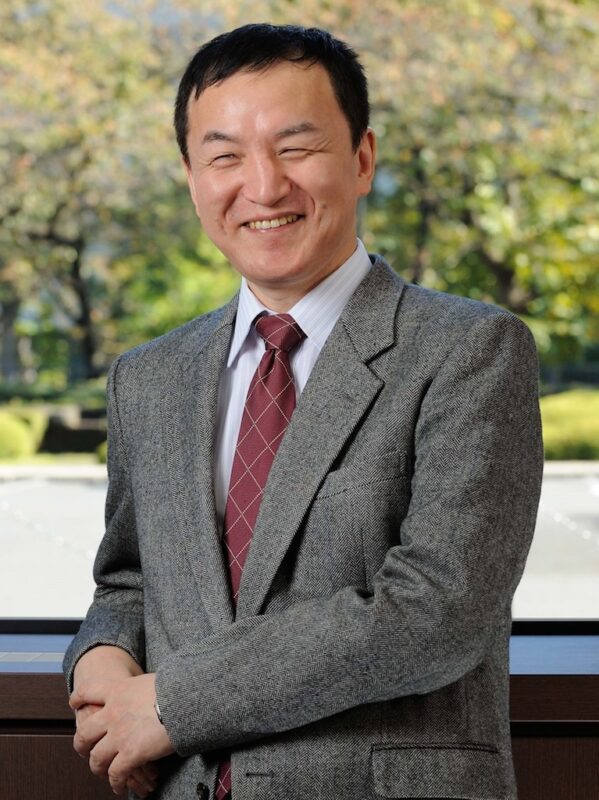
Ishikawa Jun, a member of the UN Committee on the Rights of Persons with Disabilities and a Professor at the Faculty of International Relations, University of Shizuoka COURTESY OF ISHIKAWA JUN
According to the World Report on Disability issued in 2011 by the World Health Organization and the World Bank, it is estimated that around 15% of the world’s population, or one billion people, are living with some kind of disability. Also, compared to people without disabilities, persons with disabilities face more difficulties when it comes to health, education, employment, income and other issues.
The international community is working on various initiatives to protect the human rights of persons with disabilities. In 1975 the United Nations issued the Declaration on the Rights of Disabled Persons and in 1976 decided to make 1981 the International Year for Disabled Persons. Furthermore, in 1982 it adopted the World Programme of Action Concerning Disabled Persons, voted for the United Nations Decade of Disabled Persons (1983 to 1992) and in 1993 adopted the Standard Rules on the Equalization of Opportunities for Persons with Disabilities. These declarations and programmes, however, did not adequately protect the rights of persons with disabilities, and expectations increased for the adoption of a convention with legal force.
And so, in 2001 a resolution was adopted aimed at an international convention to protect and promote the rights and dignity of persons with disabilities, while an ad hoc committee was set up to negotiate between UN members on the drafting of the convention. To realize the convention, it wasn’t only governments that participated in the committee’s negotiations; so did organizations representing persons with disabilities, under the slogan “Nothing About Us Without Us.” Following eight meetings of the committee between 2002 and 2006, in December 2006 the General Assembly of the United Nations unanimously adopted the Convention on the Rights of Persons with Disabilities. The convention came into effect in 2008, and to date (as of September 2019) Japan and 179 other countries have ratified it.
Protecting the Rights of Persons with Disabilities
The aim of the Convention on the Rights of Persons with Disabilities is to “promote, protect and ensure the full and equal enjoyment of all human rights and fundamental freedoms by all persons with disabilities, and to promote respect for their inherent dignity.” Furthermore, in order to protect the rights of persons with disabilities, it forbids all discrimination on the basis of disability, including denial of “reasonable accommodation” which is necessary and appropriate modification and adjustments not imposing a disproportionate or undue burden, while also promoting persons with disabilities’ active participation in society, independent living, and inclusion in the community.
“When it comes to changing a country’s policies regarding persons with disabilities in many countries, there is a limit to what persons with disabilities, their families, NGOs and civil society can do,” says Ishikawa Jun, a member of the UN Committee on the Rights of Persons with Disabilities since 2016 and a Professor at the Faculty of International Relations, University of Shizuoka. “With the Convention on the Rights of Persons with Disabilities, however, it has become possible to exert international pressure on different national governments to realize systems and policies protecting and promoting rights of persons with disabilities.”
The Committee on the Rights of Persons with Disabilities is a body that was established based on the convention and is composed of eighteen members. State parties that have joined the convention are obliged to provide reports on the progress of its implementation to the Committee on the Rights of Persons with Disabilities within two years from when it first comes into effect, and every four years after that. As well as reports from governments, reports from civil society groups including organizations representing persons with disabilities (parallel reports) are also submitted to the committee. On the basis of these and following closed meetings between the committee and civil society groups, public meetings with government delegations (constructive dialogue) are held. On top of that, Concluding Observations bringing together the committee’s recommendations for improvement are also published. Committee members gather in Geneva, Switzerland twice a year for four or five weeks at a time to conduct these meetings.
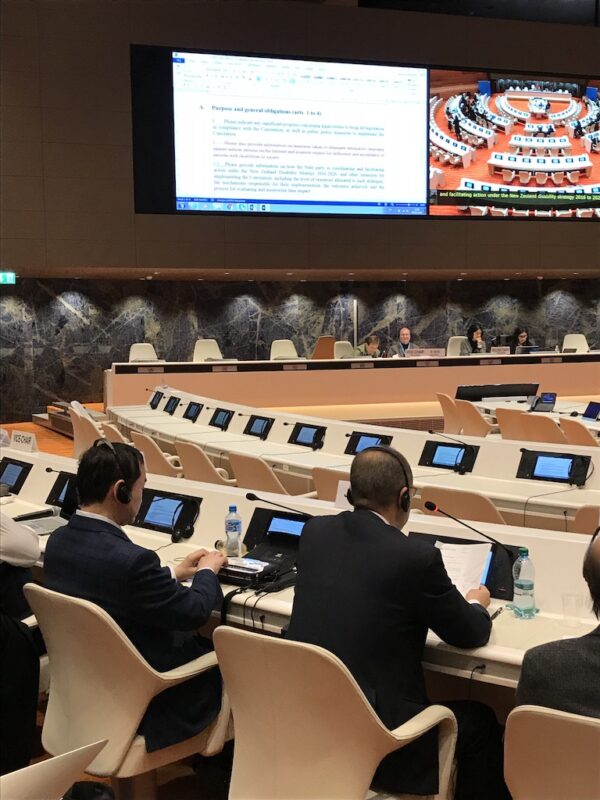
Ishikawa Jun (left) attends a meeting of the UN Committee on the Rights of Persons with Disabilities in Geneva, Switzerland. COURTESY OF ISHIKAWA JUN
“For example, we recommend that governments establish laws and provide public education prohibiting discrimination against persons with disabilities and protecting them from abuse and violence,” says Ishikawa. “Since the number of member countries is increasing, the committee members’ work is extremely hard. Yet civil society also expects much from the committee, so we work hard to meet those expectations.”
In 1977, Ishikawa was the first totally blind person to enter the University of Tokyo. After graduating from the University of Tokyo Graduate School, he started to teach at the Faculty of International Relations, University of Shizuoka as a lecturer in 1989. He has done research work in fields such as identity politics theory and disability studies. Following his graduate school master’s course, he studied in the United States and there first encountered assistive devices to support people with visual impairment, such as machines to read books aloud and braille printers. As a result, after his return to Japan he studied programming and was involved as an engineer in the development of products such as braille translation software, screen reading software, GPS enabled walking support software, and potable braille note-takers.
Following the UN adoption of the Convention on the Rights of Persons with Disabilities, Japan put in place various legal measures, such as in 2011 revising the Basic Act for Persons with Disabilities, in 2012 enacting the Services and Supports for Persons with Disabilities Act, and in 2013 enacting the Act for Eliminating Discrimination Against People with Disabilities. Then in January 2014, Japan ratified the convention. Since 2012, Ishikawa has worked as Chair of the Commission on Disability Policy of the Cabinet Office, and is deeply involved with enacting and revising these laws, and also the drafting of policies relating to persons with disabilities.
“When I was young, there was a lot of discrimination against persons with disabilities, and also very few laws, systems, and assistive technologies available to support persons with disabilities. Compared to then, the situation has changed greatly in many respects,” says Ishikawa. “Even today, however, Japan is behind in the introduction of inclusive education (where persons with and without disabilities can study together). This limits the opportunities for the majority of persons without disabilities to contact with persons with disabilities until they become adults. The goal going forward is to create a society in which everyone can naturally have opportunities to meet persons with disabilities from childhood.”
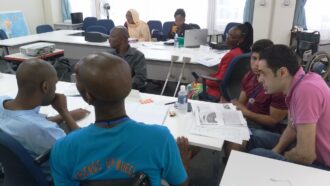
Participants on the JICA training course “Promoting Independent Living through Empowerment of Persons with Disabilities in Africa” COURTESY OF JICA
In 2018, Ishikawa contributed as a lecturer on a course in Japan for participants from developing countries on the invitation of the Japan International Cooperation Agency (JICA), sharing his knowledge and experience he’d gained to date at home and overseas. One was held in July (Promoting Independent Living through Empowerment of Persons with Disabilities in Africa) and another in October (Capacity Development of Leaders with Disabilities for UN Convention on the Rights of Persons with Disabilities Implementation). Both were attended by leaders with disabilities from overseas including Africa and Asia, and featured lectures and observation tours on Japan’s policies and education for persons with disabilities, and on how they live independently. During the training, Ishikawa gave lectures on global developments related to the Convention on the Rights of Persons with Disabilities and progress on implementing it in Japan.
“I tried to show the participants how no progress will happen if they just wait,” says Ishikawa. “If they act first, other people will appear to do things alongside them.”
The Work of JICA
Since the 1960s, JICA has been working on activities on disability and development in developing countries through dispatching Japan Overseas Cooperation Volunteers (JOCV) and other initiatives. Between 1965 and the end of 2018, around 3,000 JOCV and Senior Volunteers have been dispatched to work on activities in the disability and development area. Cooperation is also happening through various other schemes, including technical cooperation, the JICA Partnership Program, grant aid and ODA loans.
JICA currently takes a twin-track approach regarding its policies to implement activities on disability and development: disability mainstreaming and disability-specific intervention. In disability mainstreaming, “persons with disabilities participate in the development process, including planning and implementation stages, as beneficiaries as well as agents for development by incorporating the perspective of disability into every sector and every development effort.” Disability-specific intervention includes “empowerment, capacity development and enhancing efforts for the better access to care of impairments, for persons with disabilities and their families as the primary beneficiaries, in order for persons with disabilities to enjoy human rights equally with others without disabilities.”
In accord with these policies, JICA is working on a wide range of projects in different countries.

A person with a disability (center) working at a hotel in Amman, Jordan with (from left) his colleague, supervisor, job coach and a director of a local NGO supporting persons with intellectual disabilities COURTESY OF JICA
In Jordan for example, JICA has implemented its Project of Economic Empowerment and Social Participation of Persons with Disabilities (from 2017 to 2020) with the Ministry of Labour as a counterpart. In Jordan, although there is work being done to support persons with disabilities based on the 1998 Persons with Disabilities Welfare Law, even today very few persons with disabilities are able to work for general companies. The project is being implemented to develop “job coaches” and strengthen the capacity of the counterpart organization to promote regular employment of persons with disabilities. The job coaches specialize in supporting persons with disabilities from when they first get a job to when they are settled in it. Their role is to identify issues in the workplace, suggest improvements, and create an environment where persons with disabilities can work without facing any barriers. So far, the various participants have included not only staff from the Ministry of Labour and private companies, but also members of NGOs that support the hiring of Palestinian and Syrian refugees. These participants are accredited both as job coaches and job coach trainers.
Furthermore, the project includes initiatives to empower Syrian refugees with disabilities. As part of that initiative, persons with disabilities themselves work as facilitators, while there is also Disability Equality Training (thinking about social barriers and social participation), peer counseling for persons with disabilities (peer counseling for persons with disabilities so that they can live independently), and support for activities of groups of persons with disabilities.
In South Africa too, JICA has implemented its Project for the Promotion of Empowerment of Persons with Disabilities and Disability Mainstreaming (from 2016 to 2020) with the Department of Social Development (DSD) as a counterpart.
In South Africa, persons with disabilities (around 2.87 million people) account for an estimated 7.5% of the population aged five or older. Yet, most persons with disabilities lack opportunity to access to health, education and employment, so are placed in an extremely vulnerable position. The South African government ratified the Convention on the Rights of Persons with Disabilities in 2007 and has worked on developing policies so that various social services benefit more persons with disabilities. Nevertheless, it faces the problem that such policies are not sufficiently implemented at the community level.
To improve this situation, the project has developed a method to support disability mainstreaming and empowerment of persons with disabilities on a community level with the government of South Africa. As part of the project, one district from each of the four provinces has been selected as a project site and a working group was established in each site. The working groups are composed of many members, including officials of DSD; national, province, and district officials; representatives of organizations of persons with disabilities, and persons with disabilities themselves, and so on. They are responsible for planning and implementing projects in the sites.
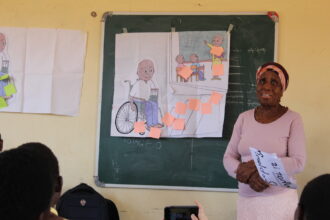
A disability awareness-raising activity at Limpopo Province in South Africa, one of JICA’s project sites
The project conducts various activities including peer counseling, supporting the establishment of self-help groups for persons with disabilities, disabilities awareness sessions in communities and access audits for public facilities and so on. In addition, a workshop was organized, where a representative of an NPO in Okinawa who had been involved for many years in setting up and strengthening self-help groups of persons with disabilities was invited as a short-term expert. In Okinawa, a two-week Knowledge Co-Creation Program for training was held, attended by officials and persons with disabilities from South Africa.
The project, which is scheduled to finish in May 2020, continues to work with the South African government so that they will implement and expand the methods developed through the project by themselves after the completion of the project.
SAWAJI Osamu, The Japan Journal
Note: This article first appeared in the November/December issue of the Japan Journal.

